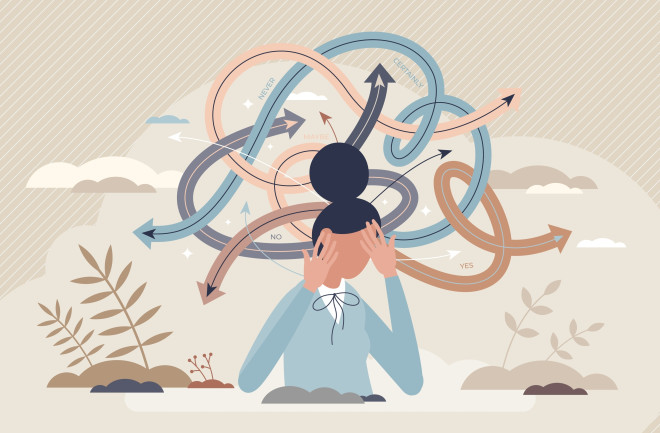OCD is an anxiety disorder that typically affects people aged 18 and older. It is characterized by intrusive, obsessional thoughts that cause significant distress or impairment. These thoughts are usually about things that are perceived as unacceptable, such as harming oneself or others, religion, and religious beliefs. In a blog post, we will explore one way in which blasphemous thoughts can manifest in OCD and how to deal with them. By understanding the nature of these thoughts and how to deal with them effectively, you can improve your overall quality of life.
Contents
What are Blasphemous Thoughts In OCD?

OCD is an anxiety disorder that can cause a person to develop unwanted, intrusive thoughts and obsessions. These thoughts can range from being mildly distressing to being extremely upsetting. One of the most common types of intrusive thoughts is blasphemous or religious. Blasphemous OCD involves having repeated doubts and fears about one’s religious beliefs or spiritual values. People with blasphemous OCD worry that their thoughts and behaviors are sinful, even though they may not believe in the religion or spiritual practice they are questioning.
For people with blasphemous OCD, these intrusive thoughts can cause intense anxiety and fear. Sometimes, the individual will feel compelled to engage in rituals, superstitious behavior, or pray for forgiveness to “cancel out” their blasphemous thoughts. This can lead to a cycle of constant thought suppression and ritualistic behavior that only serves to reinforce the person’s fear and anxiety.
Causes of Blasphemous Thoughts in OCD
There are many possible causes of blasphemous thoughts in OCD. Some people with OCD may have intrusive blasphemous thoughts that never go away, or they may have repetitive blasphemous thoughts that become more severe over time.
Some possible causes of blasphemous thoughts in OCD include:
- Having a difficult time accepting religious beliefs or symbols
When you struggle to accept a religious belief or symbol, it can leave you feeling anxious and unable to focus on anything else. This could lead to blasphemous thoughts.
- Fear of punishment from a higher power
Those with OCD may have a heightened fear that they will be punished for their actions by a higher power. As these fears become overwhelming, they may manifest in the form of blasphemous thoughts.
- Anxiety and fear
Anxiety and fear can lead to intrusive thoughts that are often considered blasphemous. As anxiety increases, these types of thoughts can become more frequent and intense.
- Low self-esteem or feelings of guilt or shame
Feelings of low self-esteem or guilt can cause a person to be more prone to intrusive blasphemous thoughts. This is because they may feel that they are not worthy of divine love, and these feelings can trigger blasphemous thoughts.
- A need for control
Those with OCD often experience a strong need for control over their environment. This can lead to intrusive thoughts that are blasphemous as they try to gain control over their situation.
Stress can play a major role in the development of OCD, and it can also be a factor in triggering blasphemous thoughts. Traumatic experiences can lead to intrusive thoughts that contain blasphemous content, making them harder to ignore or resist.
- Having a negative thought loop
When someone is stuck in a negative thought loop, their intrusive thoughts can become more severe and blasphemous. This can be especially true for those with OCD because they often have difficulty escaping the cycle of anxiety-provoking thoughts.
Blasphemous Thoughts in OCD: Solutions and Treatment

The key to the successful treatment of blasphemous thoughts in OCD is a combination of therapy, medications, and other methods.
Cognitive Behavioral Therapy (CBT)
One treatment approach for blasphemous thoughts in OCD is Cognitive Behavioral Therapy (CBT). CBT teaches individuals to identify and change their irrational thought patterns and behaviors. This can help an individual learn how to respond more effectively to distressing thoughts, instead of trying to avoid them. The goal of CBT is to teach healthy coping skills so that the individual can manage their symptoms and ultimately reduce the intensity of their OCD.
Dialectical Behavioral Therapy
One therapy approach for blasphemous thoughts in OCD is Dialectical Behavioral Therapy (DBT). DBT helps an individual learn to accept and tolerate their distressing thoughts, instead of trying to avoid them. DBT is based on the idea that when we can’t change our environment, we can change how we respond to it. Individuals learn to regulate their emotions and become more mindful of the present moment.
Exposure and Response Prevention (ERP)
Exposure and Response Prevention (ERP) is a form of cognitive-behavioral therapy that involves gradually exposing an individual to their distressing thoughts while preventing them from engaging in rituals or behaviors associated with their OCD. This helps the individual gain control over their responses to the thoughts and become less afraid of them. Through a series of exposures, an individual can learn to manage their symptoms and ultimately reduce the intensity and frequency of blasphemous thoughts in OCD.
Medication
In some cases, medication can be used to help manage blasphemous thoughts in OCD. Selective serotonin reuptake inhibitors (SSRIs) are commonly prescribed for OCD symptoms. SSRIs work by increasing levels of serotonin, a neurotransmitter that is thought to be involved in regulating mood and anxiety. These medications are taken orally, usually daily.
Self-Help Strategies

In addition to traditional treatments, several self-help strategies can help reduce the intensity and frequency of the thoughts in OCD. These include:
- Mindfulness training to train yourself to become more aware of your thoughts and learn how to respond to them differently
- Writing down or talking about your thoughts when they arise, as a way of confronting them
- Relaxation techniques such as deep breathing, mindfulness meditation, and progressive muscle relaxation
- Keeping a journal to track patterns in your thoughts
- Developing healthy coping strategies for managing stress
- Seeking social support from family and friends.
Support Groups
There are also support groups specifically for individuals dealing with blasphemous thoughts in OCD. These support groups provide a safe, nonjudgmental environment where individuals can share their experiences and learn coping strategies from each other. The sense of community that comes with being part of a group can also be very helpful in managing symptoms.
With the right treatment plan and support, individuals with blasphemous thoughts in OCD can learn to manage their symptoms and have a better quality of life.
Conclusion
OCD can be a debilitating condition, often leading sufferers to believe thoughts or gestures are blasphemous. But what is going on in the minds of those with OCD? In this article, we explore the theory that these blasphemous thoughts may be grounded in reality. By understanding how OCD works and why blasphemous thoughts may become entrenched, we can help sufferers challenge their false beliefs and start to live more fulfilling lives. With the right combination of therapy, medications, and other interventions, individuals with OCD can find relief from their blasphemous thoughts.
For more information and guidance, please contact MantraCare. OCD is a mental health disorder characterized by obsessions and compulsions. If you have any queries regarding Online OCD Counseling experienced therapists at MantraCare can help: Book a trial OCD therapy session.


